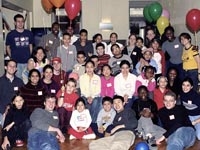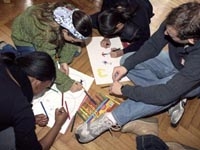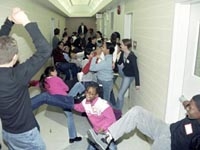
Big Buddies strike a pose with the "little buddies."
This past December, Weill Cornell medical students met with children and their parents in the Alumni Lounge of Olin Hall for a Sunday afternoon of fun. The event was sponsored by Big Buddies, a youth mentorship program run by Weill Cornell medical students in conjunction with the Pediatric Primary Care Practice of NewYork-Presbyterian Hospital (Weill Cornell campus), which serves a mostly Medicaid population.
Dr. Lyuba Konopasek, a faculty adviser for Big Buddies and director of the first-year "Medicine, Patients and Society I" course, first noted the need for a mentorship program based on her interactions with the children in the pediatric clinic. Eventually, with Dr. Konopasek's guidance, Big Buddies was started in the summer of 2001 by Weill Cornell students Kavita Parikh and Kalliope Tsirilakis.
Big Buddies is modeled after the Big Brothers, Big Sisters Program of New York, and seeks to join Weill Cornell students with children from the clinic for an enriching one-on-one relationship. The mission is twofold—benefiting both the children and the medical students. The medical student provides individual attention to the child, boosting his or her self-esteem and serving as a positive role model while aiding in healthy youth development. Similarly, through effective mentoring, the medical students are preparing for their roles as future physicians and child advocates.

Buddies draw Venn diagrams of their overlapping and non-overlapping interests.
The "little buddies," comprised of children aged 8 to 16, are chosen by residents at the clinic for the Big Buddies program. Each child is matched with a trained medical student who acts as a mentor and role model.
During the year, buddy pairs chat on the phone and go on occasional outings. Buddies also visit places like the zoo, movies, museums and restaurants. The outings are an opportunity for buddies to become acquainted with one another and to share the rich experiences to be found in New York City.
And then there are the games.
"Elbow to knee!" is yelled across the room. A scramble of activity ensues, and as the dust clears, 20 buddy pairs stand awkwardly with an elbow touching each other's knee. The referee furrows his brow. All eyes expectantly turn toward him.

Buddies play "Huckle Buckle."
"The tall guy in red and the kid in blue were the fastest!" The named buddy pair exchange high fives and immediately begin brainstorming their next assignment.
"Foot to back!" Consternation, followed by a flurry of activity, result in some buddies on all fours and others with their feet reaching up to touch their pals' backs.
The name of this game was "Huckle Buckle," just one of the many activities of the day. Others included ice breakers, decorating cookies, and making cards for the car service company that volunteered to bring all the kids and their parents from around the city to participate in the day's festivities. The buddy pairs meeting each other for the first time drew Venn diagrams of their overlapping and non-overlapping interests. Seasoned buddy pairs drew pictures of activities they had done together and places they had visited over the past year.
The day served as an introduction to the program for the buddies. It was also an opportunity for parents to meet their child's new mentor. For old buddy pairs, it was a chance to hang out with their peers in the program. Judging by all the excitement and laughter of the afternoon, much fun was had by all, boding well for future events.

